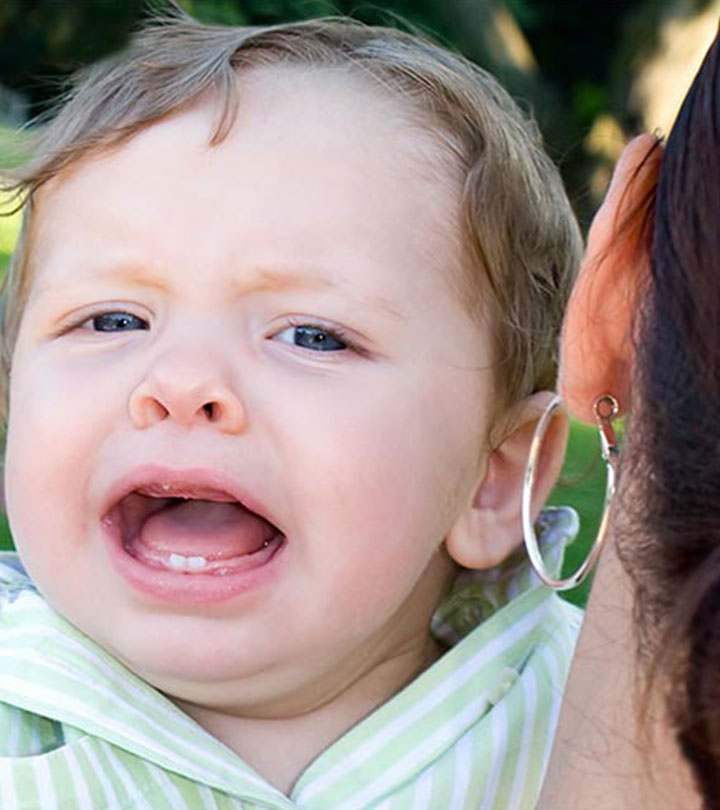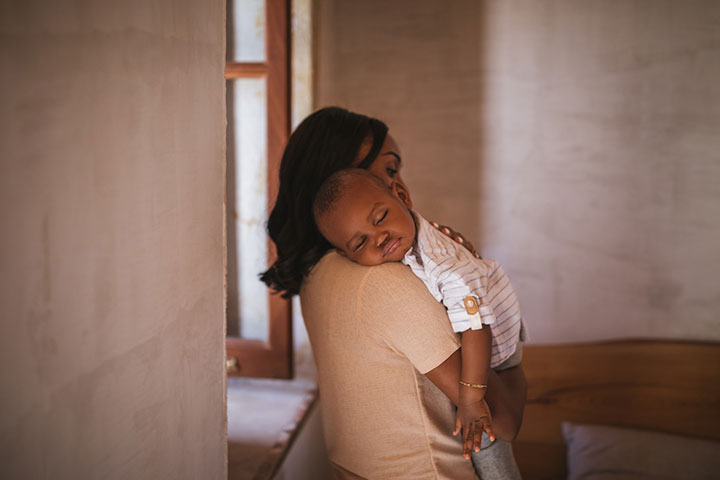Babies cannot communicate in the way other people do, at least until about three years. So if you have a whiny baby, do not always consider it a tantrum. Instead, babies use whining as a form of communication to tell or express other people about their discomfort or frustration. But whining often might put the parents’ patience to the test. So what do you do in such situations to manage your baby? Read on to know about why a baby is whining and ways to manage it.
What Is Whining In Babies?
Whining in babies can be explained as a form of frustration due to their inability to perform an action or an unexpected outcome of a performed action. A baby may start whining as a response to something or to express feelings such as hunger, pain, and tiredness. Babies usually start whining in the fourth month of their life, or a couple of months after that (1).
Whining, thus, is a cry for communication. But what are the various messages that a baby can convey by whining? We tell you about that next.
Why Do Babies Whine?
The reasons for whining can range from boredom or frustration in general to a probable manifestation of a health ailment. Let’s see them all.
1. Cannot communicate beyond a limited point
Your baby will babble for the first time after the completion of four months. You will notice that they babble differently in different situations. Despite that, their range of effective communication is limited, and the baby cannot share complex emotions through basic sounds. As a result, most babies may resort to whining. In other words, whining is the best way for babies who cannot yet talk, to get their feelings across quickly.
2. Communicate about hunger
Babies have limited vocabulary and minimal speech capabilities. The best way they can share their thoughts is through whining and crying. If your baby whines, then it is quite likely that the baby is asking you for a feed.
3. Tired
Your little one requires a lot of rest and sleep, and any exerting activity such as a long car journey can tire them out quickly. If your baby whines after staying awake for long hours, it means they are tired, possibly due to sensory overload, and wants to slumber. Usually, whining in such cases will be accompanied by generally being irritable, having a bad temperament, and being disinterested in interacting with others.
4. Needs a diaper change
The next time your baby whines, check the diaper immediately. Chances are they just defecated or urinated and need a diaper change. Whining is just their way of telling you that – to change a soggy diaper and relieve them of the discomfort which may lead to diaper rash if not addressed properly.
3. Feeling hot or cold
You put your baby in a warm bath on a cold morning, and the baby suddenly begins to whine. That is, most probably, their way of telling that the water is not quite warm. Babies are sensitive to temperature fluctuations and could whine when they do not find it suitable to their liking. This may even happen when you move your baby to a new place, where the temperature is too hot or too cold for the baby.
6. Could be fever, rash or pain
Your baby could just be feeling uneasy due to a fever and is communicating it through whining. So, check if the baby has a fever, an insect bite, or itchy rash that is causing them irritation. As babies get older, they become mobile and crawl, which can cause them bruises here and there. Whining is a way of expressing pain if they get bruised or injured. Check for any scratches or bruises on the little one’s body if they whine.
7. That naughty air bubble in the windpipe
This is quite likely to happen just after a feeding session. Your baby may start whining for no apparent reason, but it could be an air bubble, stuck in their throat, and causing them discomfort. A gentle pat on the back should be able to release it through a burp.
8. He needs some pampering
Your baby could whine for you to hold and cuddle them. It could be one way of them asking you to “stay close” or “hold me tight”. It is just their desire to have a sense of security and attention that may make them whine but positively. Research suggests that babies may cry or whine to attain the complete attention of their parents, which can result in a healthy upbringing since the parent is always around to protect and feed the little one (2).
9. Overtired and refuses to sleep
Overtired babies are usually reluctant to sleep. In such cases, avoid eye contact with them as your gestures also might be tiresome for the baby. Take the baby to a dark and quiet room and cajole them into sleeping.
Whining is not always a positive sign. Sometimes, it could be the result of some health condition, which your baby is unable to communicate.
Critical Reasons
10. Language issues due to autism
Babies born with autism have impaired language development (3). This means the baby is less likely to pick up new words and more likely to have a deficiency in verbal communication. A baby with autism may whine due to the frustration caused by the inability to communicate any thoughts. This is more likely to happen when you say or do something that the baby is unable to comprehend and has difficulty reacting to.
Some babies with autism may have trouble digesting amino acids in the protein gluten, which is found in grains such as wheat, barley, rye, and oats (4). These foods are quite commonly given to weaning babies. The unbroken amino acid chains, called peptides, breach the intestinal wall and reach the brain through the bloodstream. When this happens, the body’s immune system gets alerted and mounts an allergic reaction that may result in a stomachache and neurological symptoms such as hyperactivity, aggression, and chronic whining.
11. Gastrointestinal reflux
Babies tend to develop gastrointestinal or acid reflux due to an underdeveloped lower esophageal sphincter, which is a bundle of muscles present at the point where the esophagus meets the stomach. Its primary function is to prevent the backflow of stomach contents into the esophagus. In babies, a poorly developed sphincter releases some stomach acid to the esophagus, causing pain, gas, and irritation. Being fussy, crying, or whining is one of the symptoms of this condition (5).
In such cases, your baby may whine a few minutes after feeding or during the feeding. A collaborative study conducted by multiple institutions found that over 25% of infants aged 0-18 months experience daily symptoms of GERD. However, the review also indicated that these symptoms typically resolve completely by the time the infants turn 12 months.
How To Deal With A Whiny Baby?
A whining baby can test your patience, especially when you do not see a reason for it. The following tips should help you the next time your little one whines.
1. Stay calm, be patient
If your baby whines, then it is for a reason. Do not let the whining annoy or anger you, no matter how difficult it gets. You are the only one who can understand your baby’s whining. Also, you will not become a bad parent just because your baby whines frequently. Therefore, take deep breaths, stay calm, and be patient. If the situation is exhausting you, take a break. Give the baby to your partner or any other caretaker, go for a walk, and come back. Even a 10-minute break would bring back your sanity.
2. Breastfeed for relief
Breastfeeding not just provides the much-needed nourishment to your baby but is also a time of bonding between the mother and baby. The next time your baby whines, just hold them in your arms and feed. Skin-to-skin contact and your heartbeat can calm your baby’s whining.
3. Teach your baby basic yet useful communication
You can make your baby learn simple sounds or expressions to convey specific emotions. For example, when the baby whines, you can show the milk bottle and ask, “Are you hungry?”. If the baby stops crying and reaches out for the bottle, then you just fixed your baby’s whining!
As the baby goes through developmental changes, the baby will eventually connect hunger with the bottle and understand that the solution to his hunger is the bottle. You can teach your baby about such object-cause-effect relationships through simple words and sign language.
Either way, asking questions, using verbal cues and basic signs and sounds are great ways to make your little one communicate.
4. Eliminate the probable sources of whining
Does your baby always whine if a sibling or playmate takes their toys away? If yes, sort the matter by getting your elder child a new toy. Does your baby whine when being held by a certain family member? Let that member keep away from the baby. Check for such inconspicuous stimuli for your baby’s whining and eliminate them to mitigate whining.
5. Rock your baby
It is a time-tested trick that works so well that experts recommend it for crying and whining babies (6). Hold the baby on your shoulder, and rock them back and forth. You can also hold your baby in your arms and sit on a rocking chair or put them in a rocking cradle to subdue the whining.
6. Play some sounds
Sounds from the baby’s toys or music can help distract the baby and stop their whining. The next time your little one whines, play some peppy and catchy music that will divert their attention.
7. Swaddle the baby
Swaddle your baby by wrapping them in a soft blanket with the head out of the wrap. This is one of the best calming techniques for a baby, especially when the probable cause is fluctuations in the temperature. A stable, comfortable room temperature will help your baby relax.
8. Change clothes and diaper
Always dress your baby in clothes that are appropriate for the weather. Also, change the diaper at regular time intervals even if the baby has not soiled it. Diapers have an external plastic lining that restricts air circulation that can cause discomfort to the baby, making them whine.
9. Give them a relaxing massage
A gentle massage is a wonderful way to deal with a baby’s whining. Place your baby on the back and gently massage the tummy in circular motions. You can also place them on the tummy and massage the back, arms, and legs. The parent’s soothing touch could calm a whiny baby.
10. Give a hot water bath
Warm water soothes adults and babies alike. Give your whining little one a warm bath. Dress them and then swaddle them in a warm blanket. You can follow this with a feeding session to calm your baby completely. Be cautious, though, since some babies dislike water and whine the most when they come in contact with water.
11. Pat the back
Hold your baby on your shoulders and gently pat between the shoulder blades. This should release the trapped air bubble and stop them from whining.
12. Use a pacifier
A pacifier works in soothing a shiny baby, especially when the baby is bottle-fed. Babies can steady their heart rate and calm themselves down when they are sucking at something. It is a convenient way to deal with your whining baby.
13. Go for a walk
Perhaps your baby is just bored and needs a change in the surroundings. Put your baby in a stroller and take them out for a walk. Show interesting sights and objects, and they could get distracted and amused, and stop whining.
What If Nothing Works?
You may have tried all possible tricks, but nothing seems to work. Here are some tips for dealing with in such a situation:
1. Do not get frustrated
You must keep yourself cool even if your baby doesn’t seem to stop whining. If it is too much for you to handle, then request your partner to look after the baby for a few hours while you go out to get some fresh air. Do not hesitate to ask for help. Give a call to your mom, sister, or a reliable friend and ask them to stay with you for a few days. It will give you the needed emotional and psychological strength to deal with the stress caused by a whining baby.
2. Check with the pediatrician
As mentioned above, there can be some serious connotations for a baby’s whining. If you feel something is abnormal about your baby’s whining, then talk to a pediatrician soon. A medical practitioner will be able to see beyond the usual whining to detect an acute underlying cause to it.
In case your baby has a more serious cause for whining, do not slip into a panic state. Keep your nerves calm. Discuss the matter thoroughly with your pediatrician and take a second opinion if you think it necessary.
Whining in babies is a way of communicating boredom, frustration, hunger, pain, discomfort, tiredness, or the need for attention as they cannot speak what they feel. It is best to attend to your little one during the episodes of whining promptly as it may indicate illness or disorder in some cases. Try calming them with a pacifier, soothing music, breastfeeding, or a diaper change. Have patience or ask your partner or a relative to help you with the baby. Check with a pediatrician if your whiny baby does not respond to your attempts to comfort them.
Key Pointers
- Generally, the causes of a baby’s whining include hunger, tiredness, sleepiness, stomach discomfort, pain, or boredom.
- It is vital to respond kindly to the baby’s needs.
- Breastfeeding, rocking, massaging, changing the diaper, or swaddling the baby may soothe them.
- Teaching them basic communication methods, setting boundaries, eliminating irritants, or distracting the child could help.
- However, if the baby cries for long periods, it is crucial to contact a pediatrician to rule out issues.
Dealing with a whiny baby can be frustrating. Learn 8 reasons why your baby is whiny and solutions to help them stop!














